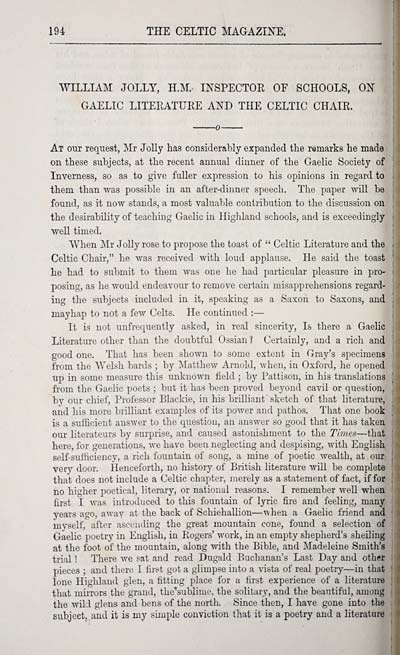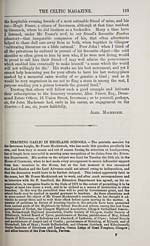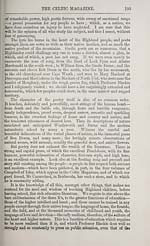Blair Collection > Celtic magazine > Volume 3
(204)
Download files
Complete book:
Individual page:
Thumbnail gallery: Grid view | List view

194 THE CELTIC MAGAZINE.
WILLIAM JOLLY, H.M. INSPECTOR OF SCHOOLS, ON
GAELIC LITERATURE AND THE CELTIC CHAIR.
At our request, Mr JoUy has considerably expanded the remarks he made
on these subjects, at the recent annual dinner of the Gaelic Society of
Inverness, so as to give fuUer expression to his opinions in regard to
them than was possible in an after-dinner speech. The paper will be
found, as it now stands, a most valuable contribution to the discussion on
the desirability of teaching Gaelic in Highland schools, and is exceedingly
well timed.
When Mr JoUy rose to propose the toast of " Celtic Literature and the
Celtic Chair," he was received with loud applause. He said the toast
he had to submit to them was one he had particular pleasure in pro-
posing, as he would endeavour to remove certain misapprehensions regard-
ing the subjects included in it, speaking as a Saxon to Saxons, and
mayhap to not a few Celts. He continued : —
It is not unfrequently asked, in real sincerity. Is there a Gaelic
Literature other than the doubtful Ossian? Certainly, and a rich and
good one. That has been shown to some extent in Gray's specimens
from the Welsh bards ; by Matthew Arnold, Avhen, in Oxford, he ojjened
up in some measiu'e this unknown field ; by Pattison, in his translations
from the Gaelic poets ; but it has been proved beyond cavil or question,
by our chief. Professor Blackie, in his brilliant sketch of that literature,
and his more brilliant examples of its power and pathos. That one book
is a sufficient answer to the question, an answer so good that it has taken
our literateurs by surprise, and caused astonishment to the Times — that
here, for generations, we have been neglecting and despising, with English
self-sufficiency, a rich fountain of song, a mine of poetic wealth, at our
very door. Henceforth, no history of British literature will be complete
that does not include a Celtic chapter, merely as a statement of fact, if for
no higher poetical, literary, or national reasons. I remember well when
first I was introduced to this fountain of lyric fire and feeling, many
years ago, away at the back of SchiehaUion — when a Gaelic friend and
myself, after ascending the great mountain cone, found a selection of
Gaelic poetry in English, in Rogers' work, in an empty shepherd's shelling
at the foot of the mountain, along with the Bible, and Madeleine Smith's
trial ! There we sat and read Dugald Buchanan's Last Day and other
pieces ; and there I first got a glimpse into a vista of real poetry — in that
lone Hi^ddand glen, a fitting place for a first experience of a literature
that mirrors the grand, the'sublime, the solitary, and the beautiful, among
the will glens and bens of the north. Since then, I have gone into the
subject, and it is my simple conviction that it is a poetry and a literature
WILLIAM JOLLY, H.M. INSPECTOR OF SCHOOLS, ON
GAELIC LITERATURE AND THE CELTIC CHAIR.
At our request, Mr JoUy has considerably expanded the remarks he made
on these subjects, at the recent annual dinner of the Gaelic Society of
Inverness, so as to give fuUer expression to his opinions in regard to
them than was possible in an after-dinner speech. The paper will be
found, as it now stands, a most valuable contribution to the discussion on
the desirability of teaching Gaelic in Highland schools, and is exceedingly
well timed.
When Mr JoUy rose to propose the toast of " Celtic Literature and the
Celtic Chair," he was received with loud applause. He said the toast
he had to submit to them was one he had particular pleasure in pro-
posing, as he would endeavour to remove certain misapprehensions regard-
ing the subjects included in it, speaking as a Saxon to Saxons, and
mayhap to not a few Celts. He continued : —
It is not unfrequently asked, in real sincerity. Is there a Gaelic
Literature other than the doubtful Ossian? Certainly, and a rich and
good one. That has been shown to some extent in Gray's specimens
from the Welsh bards ; by Matthew Arnold, Avhen, in Oxford, he ojjened
up in some measiu'e this unknown field ; by Pattison, in his translations
from the Gaelic poets ; but it has been proved beyond cavil or question,
by our chief. Professor Blackie, in his brilliant sketch of that literature,
and his more brilliant examples of its power and pathos. That one book
is a sufficient answer to the question, an answer so good that it has taken
our literateurs by surprise, and caused astonishment to the Times — that
here, for generations, we have been neglecting and despising, with English
self-sufficiency, a rich fountain of song, a mine of poetic wealth, at our
very door. Henceforth, no history of British literature will be complete
that does not include a Celtic chapter, merely as a statement of fact, if for
no higher poetical, literary, or national reasons. I remember well when
first I was introduced to this fountain of lyric fire and feeling, many
years ago, away at the back of SchiehaUion — when a Gaelic friend and
myself, after ascending the great mountain cone, found a selection of
Gaelic poetry in English, in Rogers' work, in an empty shepherd's shelling
at the foot of the mountain, along with the Bible, and Madeleine Smith's
trial ! There we sat and read Dugald Buchanan's Last Day and other
pieces ; and there I first got a glimpse into a vista of real poetry — in that
lone Hi^ddand glen, a fitting place for a first experience of a literature
that mirrors the grand, the'sublime, the solitary, and the beautiful, among
the will glens and bens of the north. Since then, I have gone into the
subject, and it is my simple conviction that it is a poetry and a literature
Set display mode to: Large image | Transcription
Images and transcriptions on this page, including medium image downloads, may be used under the Creative Commons Attribution 4.0 International Licence unless otherwise stated. ![]()
| Early Gaelic Book Collections > Blair Collection > Celtic magazine > Volume 3 > (204) |
|---|
| Permanent URL | https://digital.nls.uk/76445835 |
|---|
| Description | Volume III, 1878. |
|---|---|
| Shelfmark | Blair.4 |
| Attribution and copyright: |
|
| Description | A selection of books from a collection of more than 500 titles, mostly on religious and literary topics. Also includes some material dealing with other Celtic languages and societies. Collection created towards the end of the 19th century by Lady Evelyn Stewart Murray. |
|---|
| Description | Selected items from five 'Special and Named Printed Collections'. Includes books in Gaelic and other Celtic languages, works about the Gaels, their languages, literature, culture and history. |
|---|

